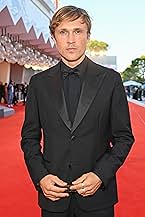Die Geschichte eines Jungen im turbulenten Neapel der 1980er Jahre. Sorrentinos bisher persönlichster Film ist eine Geschichte über Schicksal und Familie, Sport und Kino, Liebe und Verlust.Die Geschichte eines Jungen im turbulenten Neapel der 1980er Jahre. Sorrentinos bisher persönlichster Film ist eine Geschichte über Schicksal und Familie, Sport und Kino, Liebe und Verlust.Die Geschichte eines Jungen im turbulenten Neapel der 1980er Jahre. Sorrentinos bisher persönlichster Film ist eine Geschichte über Schicksal und Familie, Sport und Kino, Liebe und Verlust.
- Regie
- Drehbuch
- Hauptbesetzung
- Für 1 Oscar nominiert
- 32 Gewinne & 66 Nominierungen insgesamt
Betty Pedrazzi
- Baronessa Focale
- (as Betti Pedrazzi)
Empfohlene Bewertungen
Although I have only an embryonic understanding of Italian, I felt the rhythm and mood of the scenes allowed me to feel the soul of Naples on a cellular level.
It is a very difficult challenge to try to lightly tell such a personal and traumatic drama as it happens in "The hand of God". The director Sorrentino tries to face it without veils and metaphors, keeping only his very personal taste for the grotesque and decadence because- as he tries to explain several times in the film- after the personal tragedy he experienced as a teenager, he no longer likes reality: "the reality is poor". Yet reality can also be extraordinary, so much so as to generate one of the best contemporary Italian directors from a such atrocious trauma.
A brilliant piece of filmmaking that totally took my breath away. This feels a lot personal because it is. Sorrentino created this film with an enormous love and you just feel it. His use of camara is outstanding, applying a lot of different techniques to give us some really beautiful shots and scenes, all of them unforgettable.
The first hour is magic. I laughed more than in most comedies I've seen. I was totally in awe with all those fascinating and lively characters. Everything feel so alive, so real. The sense of community is palpable.
The second hour is emotionally brutal. Sorrentino doesn't want to stay for a long time on overdramatic scenes. Just the necessary to tell his story. But he does it through powerful images and with a lot to say.
Even if this film is personal to the director, I believe this will feel familiar to a lot of us and that is the beauty of the cinema: a personal individual story can touch many people. Great homage to Napoli and cinema in a fantastic coming of age film.
The first hour is magic. I laughed more than in most comedies I've seen. I was totally in awe with all those fascinating and lively characters. Everything feel so alive, so real. The sense of community is palpable.
The second hour is emotionally brutal. Sorrentino doesn't want to stay for a long time on overdramatic scenes. Just the necessary to tell his story. But he does it through powerful images and with a lot to say.
Even if this film is personal to the director, I believe this will feel familiar to a lot of us and that is the beauty of the cinema: a personal individual story can touch many people. Great homage to Napoli and cinema in a fantastic coming of age film.
Having seen four of Paolo Sorrentino's movies now, I have finally and regrettably seen enough to admit that I am not a fan of his work. For some reasons, his movies don't engage me enough emotionally to care. Le conseguenze dell'amore (The Consequences of Love) was an interesting look into the life of a man with a dark secret, but I believed that it would have worked better as a character study if the revelation at the end had come earlier in the movie. I liked Youth better, a modest and entertaining contemplation of ageing, even though as a 40-something, it didn't fully move me either.
His celebrated La Grande Bellezza (The Great Beauty) was voted Best Movie of the Year by many, but it left me puzzled, as I saw little more than short vignettes about Roman life without much of an overall encompassing idea, story thread or theme. I watched it again to make sure that I didn't miss anything, but my response was largely the same: lots of eye candy with little nutritional value for the mind. And that is probably no coincidence, because I have the same problems and more with The Hand of God.
I know that Sorrentino's work is quite beloved and that many people probably enjoyed or will enjoy this film as a lovingly disarming portrait of family and tragedy, wrapped around a coming-of-age story. Good for them, because what I unfortunately saw again was a too loosely connected series of scenes that emotion-wise go all over the place, and felt more like numerous short films tacked together than a sincere chronicle. It took me almost half the movie to get a grip on the many family members who Sorrentino loves to present with all their peculiarities, but most of these characters are merely one-dimensional charicatures with a social or physical handicap who don't get the screen time needed to get emotionally invested in them. This would have been okay if this had been a broad comedy or even a crude farce about a dysfunctional family, but I simply didn't find it that funny. Although some scenes elicited a smile, none of them are exactly laugh out loud, and since they didn't really connect or reinforced one another, I saw little progress in the story.
When the big plot development happens in the second half, things started to look more promising for a while. But even here, Sorrentino barely uses the plot elements at his disposal to pull at some heartstrings. Every time something seems ready to be fleshed out, we cut to a completely different scene where we can enjoy the great locations and photography or another weird character, but instead of depth, it adds yet another new shade to a canvas that is already full of a wide variety of colored spots. I failed to see a bigger picture, to my regret.
Sorrentino is clearly more of a moodpainter than a good storyteller, and that is apparently what a lot of viewers love about his movies. I remember the most famous scene from Youth where Michael Caine and Harvey Keitel watch in dumbstruck awe as a beautiful young and naked woman enters their swimming pool, and Hand of God has a similar scene with Aunt Patrizia that elicits a similar mix of sensations, somewhere between awkwardness and lustful ecstasy. So for those who also loved La Grande Bellezza for its colorful mix of emotions and sensations, go and watch it. For the rest, I would recommend the Italian classic Cinema Paradiso, a deeply moving coming of age story that did work for me, or even Disney's Encanto for a truly funny and heartwarming story about dysfunctional families.
His celebrated La Grande Bellezza (The Great Beauty) was voted Best Movie of the Year by many, but it left me puzzled, as I saw little more than short vignettes about Roman life without much of an overall encompassing idea, story thread or theme. I watched it again to make sure that I didn't miss anything, but my response was largely the same: lots of eye candy with little nutritional value for the mind. And that is probably no coincidence, because I have the same problems and more with The Hand of God.
I know that Sorrentino's work is quite beloved and that many people probably enjoyed or will enjoy this film as a lovingly disarming portrait of family and tragedy, wrapped around a coming-of-age story. Good for them, because what I unfortunately saw again was a too loosely connected series of scenes that emotion-wise go all over the place, and felt more like numerous short films tacked together than a sincere chronicle. It took me almost half the movie to get a grip on the many family members who Sorrentino loves to present with all their peculiarities, but most of these characters are merely one-dimensional charicatures with a social or physical handicap who don't get the screen time needed to get emotionally invested in them. This would have been okay if this had been a broad comedy or even a crude farce about a dysfunctional family, but I simply didn't find it that funny. Although some scenes elicited a smile, none of them are exactly laugh out loud, and since they didn't really connect or reinforced one another, I saw little progress in the story.
When the big plot development happens in the second half, things started to look more promising for a while. But even here, Sorrentino barely uses the plot elements at his disposal to pull at some heartstrings. Every time something seems ready to be fleshed out, we cut to a completely different scene where we can enjoy the great locations and photography or another weird character, but instead of depth, it adds yet another new shade to a canvas that is already full of a wide variety of colored spots. I failed to see a bigger picture, to my regret.
Sorrentino is clearly more of a moodpainter than a good storyteller, and that is apparently what a lot of viewers love about his movies. I remember the most famous scene from Youth where Michael Caine and Harvey Keitel watch in dumbstruck awe as a beautiful young and naked woman enters their swimming pool, and Hand of God has a similar scene with Aunt Patrizia that elicits a similar mix of sensations, somewhere between awkwardness and lustful ecstasy. So for those who also loved La Grande Bellezza for its colorful mix of emotions and sensations, go and watch it. For the rest, I would recommend the Italian classic Cinema Paradiso, a deeply moving coming of age story that did work for me, or even Disney's Encanto for a truly funny and heartwarming story about dysfunctional families.
Authenticity and being true to oneself are large factors that define the best filmmakers of any generation. These traits are also what define Paolo Sorrentino's new film THE HAND OF GOD, a personal story of a teenager in Naples, Italy who is looking to become his own person within the chaos of an overbearing, yet loving family. Sorrentino claims to have written this film about true events that happened in his childhood, and whether or not this is true, the passion and love for the material shows through the fantastic filmmaking. Much of the first act of the film consists of the younger Sorrentino, played excellently by Filippo Scotti and named Fabietto in the narrative, being drowned out by his family's banter and gossip. The film cements into the audience the nature of the family and of the culture before it focuses in on Fabietto and becomes a personal coming-of-age story.
The very first shot of THE HAND OF GOD is one of the most stunning of 2021 -- a sweeping helicopter shot of Naples from the sea in front of it, giving viewers a look at the vastness of the city and the extent of the culture before sharing one of the many personal stories from it. THE HAND OF GOD is just as much a film about the city of Naples and the people in it as it is a story about a teenager who has a love for football (soccer in America) and his eventual desire to direct film. Sorrentino understands that his story is just one of many stories from his city that could be told in a film format, and he constantly highlights the great number of supporting characters, showing their issues as well as his own. Supposedly, Alfonso Cuaron's masterful Roma was a major inspiration for Sorrentino's decision to produce this film. Cuaron proved that a specific, personal story could become a successful and acclaimed movie that connects with people on different levels all over the world. THE HAND OF GOD will likely achieve this feat as well, delivering a story that anyone will find something in.
While the culture-specific ramblings of Fabietto's family near the beginning are essential to contextualize the story, they also drag the movie's pacing. Multiple times during the runtime, it is difficult to comprehend what direction the plot seems to be going in, which requires the audience to be patient before any direct characterization or important events kick in. However, Fabietto's story is still an entrancing one full of inspiration, self-discovery and great sadness. The film is full of oddly specific details that could only be told by someone who took those events from lived experiences, and despite the dragging pace is full of a cultural richness that is rare in a movie that crosses over to American audiences. Sorrentino shows the community of the people in Naples, Italy through their shared excitement for football superstar Diego Maradona's transfer to the Napoli club. At times, the people in Naples develop a larger attachment to Maradona than they do to their loved ones and religious beliefs, which shows the importance of community and idolization in the culture of Sorrentino's youth.
By the end, THE HAND OF GOD is a coming of age story first and foremost. The innocent bantering of the first 30 minutes feels years away by the time the final act arrives, similar to how one's first day of high school feels like a lifetime ago after turning 20 years-old. Fabietto's future feels almost within grasp when the movie ends, which is a hopeful irony given the product of his future endeavors is the very film being viewed. Sorrentino's journey back to his childhood is one worth taking, and not just if you can relate to the culture or the specific details of the story. THE HAND OF GOD is a personal story that viewers seldom see in cinemas these days, and more films need to be produced with the same intimate roots and open-minded possibilities.
A-
The very first shot of THE HAND OF GOD is one of the most stunning of 2021 -- a sweeping helicopter shot of Naples from the sea in front of it, giving viewers a look at the vastness of the city and the extent of the culture before sharing one of the many personal stories from it. THE HAND OF GOD is just as much a film about the city of Naples and the people in it as it is a story about a teenager who has a love for football (soccer in America) and his eventual desire to direct film. Sorrentino understands that his story is just one of many stories from his city that could be told in a film format, and he constantly highlights the great number of supporting characters, showing their issues as well as his own. Supposedly, Alfonso Cuaron's masterful Roma was a major inspiration for Sorrentino's decision to produce this film. Cuaron proved that a specific, personal story could become a successful and acclaimed movie that connects with people on different levels all over the world. THE HAND OF GOD will likely achieve this feat as well, delivering a story that anyone will find something in.
While the culture-specific ramblings of Fabietto's family near the beginning are essential to contextualize the story, they also drag the movie's pacing. Multiple times during the runtime, it is difficult to comprehend what direction the plot seems to be going in, which requires the audience to be patient before any direct characterization or important events kick in. However, Fabietto's story is still an entrancing one full of inspiration, self-discovery and great sadness. The film is full of oddly specific details that could only be told by someone who took those events from lived experiences, and despite the dragging pace is full of a cultural richness that is rare in a movie that crosses over to American audiences. Sorrentino shows the community of the people in Naples, Italy through their shared excitement for football superstar Diego Maradona's transfer to the Napoli club. At times, the people in Naples develop a larger attachment to Maradona than they do to their loved ones and religious beliefs, which shows the importance of community and idolization in the culture of Sorrentino's youth.
By the end, THE HAND OF GOD is a coming of age story first and foremost. The innocent bantering of the first 30 minutes feels years away by the time the final act arrives, similar to how one's first day of high school feels like a lifetime ago after turning 20 years-old. Fabietto's future feels almost within grasp when the movie ends, which is a hopeful irony given the product of his future endeavors is the very film being viewed. Sorrentino's journey back to his childhood is one worth taking, and not just if you can relate to the culture or the specific details of the story. THE HAND OF GOD is a personal story that viewers seldom see in cinemas these days, and more films need to be produced with the same intimate roots and open-minded possibilities.
A-
Wusstest du schon
- WissenswertesAccording to Paolo Sorrentino, it was Alfonso Cuarón's Roma (2018), which was based on Cuaron's childhood in Mexico City, that gave Sorrentino permission to commit his own experience to film. For Sorrentino realized that "a personal, private film could tell a universal story."
- Zitate
Antonio Capuano: Remember, those without courage don't sleep with beautiful women.
- SoundtracksNapule è
Written and performed by Pino Daniele
Top-Auswahl
Melde dich zum Bewerten an und greife auf die Watchlist für personalisierte Empfehlungen zu.
- How long is The Hand of God?Powered by Alexa
Details
- Erscheinungsdatum
- Herkunftsländer
- Offizieller Standort
- Sprachen
- Auch bekannt als
- Fue la mano de Dios
- Drehorte
- Produktionsfirmen
- Weitere beteiligte Unternehmen bei IMDbPro anzeigen
Box Office
- Budget
- 13.049.974 € (geschätzt)
- Weltweiter Bruttoertrag
- 167.909 $
- Laufzeit2 Stunden 10 Minuten
- Farbe
- Sound-Mix
- Seitenverhältnis
- 2.39 : 1
Zu dieser Seite beitragen
Bearbeitung vorschlagen oder fehlenden Inhalt hinzufügen



































